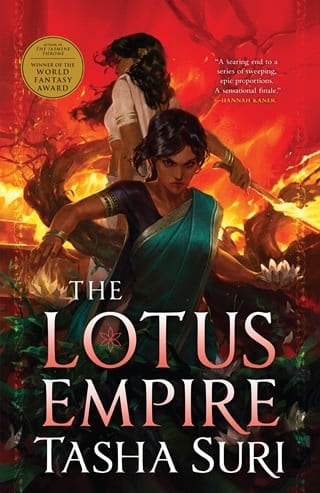Chapter 62 Rao
RAO
They made a strange group: a snaking line of priests on horseback or in carts, dressed in blue with the sun burning their skin red and then deep brown. Rao and his men—all of them armed—guarded Bhumika. Just one Ahiranyi woman, dressed in the Aloran style, with her lone guard chained beside her.
Rao kept turning to look at her. He couldn’t help it. He kept expecting her to vanish at any moment—to slip away and escape.
He wouldn’t have blamed her if she had. But she made no effort to run. She was nearly entirely silent, her gaze fixed on the distant horizon.
When they stopped to rest and make camp, three days from Parijat’s border, Bhumika finally spoke.
“Prince Rao,” she called out. He’d been helping to construct one of the tents, but he stopped when he heard her. She was still cuffed, seated on the ground by one wizened excuse for a tree, under its weak shade. “I must speak with you. Please.”
Jeevan, cuffed and seated at a distance from her, watched hawkishly as Rao kneeled by her.
“I am here,” Rao said. “What do you need from me?”
“I have given you and your empress the power to create a yaksa-killing fire, but I fear that you or your empress may use this power to destroy more than the yaksa. I fear for Ahiranya. I fear that even if you do not burn my people, your empire will turn blades upon Ahiranya. I cannot allow it.”
“Are you asking me to speak for Ahiranya? For its people?” He shook his head. “I know you think I am—chosen. Special, in some way. But I do not have as much power over the empress or the empire as you believe. If the empress or any of the kings of the empire decide to turn on Ahiranya—”
“I have withheld something from you,” she cut in. “I have given you the knowledge to kill individual yaksa. But the yaksa are more than individuals. They are the rot in the crops and soils. They are magic woven into our world. I have given you the key to killing yaksa, but I have not given you the knowledge of how to destroy them permanently, and ensure they never return. If your empress promises me the safety of Ahiranya’s people, I will give it to you, and to her.”
Rao swallowed.
“Would you believe any such promise, Lady Bhumika?”
A thin smile. “I have little choice,” she said. “I have placed myself in a position where I can save the world, but my own people may perish. I must have done so knowingly. But I have regrets. I would fight for them if I can, even if it is futile.”
“I thought your memories of your people were gone,” said Rao. Carefully, he went on, treading strange ground. “Do you… do you remember enough to have regrets?”
She looked away from him.
“Reason with your empress,” she said, voice a little more distant. “The yaksa must die. The Ahiranyi deserve to live. If she truly wants to free her empire, tell her to meet my demand, and I will give you the last of my knowledge.”
It was a deep relief when they reached Harsinghar itself, crossing the marble streets, riding between peepul trees, until they reached the imperial mahal’s great gates.
Their arrival had been noted by the city’s guards and had clearly been carried to the mahal, because one of Malini’s own personal retinue was waiting for them in her white-and-gold armor, squinting against the sun to track their approach.
“I need to speak with the empress,” Rao announced. The guard looked beyond him and then back at him, curiosity in her eyes. But Rao was still a general of the Parijatdvipan army. Still the voice of Alor, even if he’d abandoned his duties time and time again. So she nodded, barked orders at the other soldiers, and then turned back to him and said, “Follow me. Someone will see to your horses in a moment.”
They entered the corridors of the mahal together. The corridors were lined with more guards, the air heavy with tension. Rao, who’d been considering making a demand for refreshments for the priests and a chance to rest, decided to bite his tongue instead.
When he’d last left Malini, she’d grasped the heart’s shell like water in a desert. He’d thought—hoped—it would make things better. Maybe because he’d clung to that hope all this time, he was surprised and disquieted by the tension in the corridors, the way the silence hung heavy in the air.
“Rao!”
A voice calling his name. And there was Lata practically running down the corridor toward him, her hair braided up into a corona, her eyes worried and her mouth shaping a wobbly smile. He felt an answering smile break across his own face.
They didn’t embrace, but she did clasp his hands in her own. One brief grasp, and then she released him.
“I am glad you’re here,” she said.
“Although I’m glad to see you too, I thought we’d receive more of a welcome.”
Lata was gesturing at one of the guards along the edge of the corridor. “Take the priests,” she said. “See that they’re cared for. My apologies for the abrupt welcome,” she said to the priests. “The empress is glad to have you here. She will show her gladness to you once you’ve rested.”
The priests, exhausted, obediently followed the guards who were ushering them away. Only Sunder remained, his gaze fixed on Rao.
“I will be there,” Sunder said, “when you speak with the empress. She will trust my counsel.”
Said with the absolute conviction of the head priest of one of the most powerful monasteries of Alor. Rao inclined his head in agreement, even though he was not sure that Malini would feel as the priest expected her to.
Only Bhumika and Jeevan remained. Bhumika looked calm. Her gaze was sweeping the hall around them, marking it with her careful, assessing gaze.
“I must warn you, Rao,” Lata said, drawing back his attention. “Malini has… has not been herself.”
“I had some inkling,” he said.
She hesitated, then took a step forward, lowering her voice.
“She captured Priya,” Lata said.
A sense of yawning inevitability, as vast as the voice of the nameless, filled him. Both temple elders were here. Two halves of Ahiranya’s wholeness lay in imperial hands.
He wondered if the others—Sundar or Bhumika or her guard—had heard. There was a sharp look in Jeevan’s eyes. Rao ushered Lata farther away, where they could speak in relative privacy.
“Is she still… alive?”
“Yes,” she said. “Elder Priya is fine. And I think… as safe as she can be. But never mind that. Malini wants to meet you now.”
“Is Sima well?” Rao asked. He kept his voice low.
Lata’s nod was brief but emphatic.
“Come now,” said Lata. “You can meet her later. First—Malini.”
Malini was waiting in a private receiving room, with only her guards around her. Two of her guards ushered both Rao and the priest Sunder in, shutting the door securely behind him. In the corner, a scribe was writing, head tilted over their work.
He bowed low, as did Sunder beside him.
“I have another gift for you, Empress,” he said. “Another answer.”
“You have a rare gift for discovering truths, Prince Rao,” said Malini. But she was listening, with light in her eyes.
He thought of Aditya’s death, and the way the fire had bled into his own eyes, and followed him still; the ache in his skull was like a fissure in his mind, in the world. This is where you must go.
“I go,” he said, “where the nameless wills it.” Where Aditya wills it.
Then he told her what he’d learned from Bhumika.
When he had finished, Sunder stepped forward and spoke eloquently of what he had witnessed in the monastery—and of the sacrifice of one of his priests.
Malini’s expression was unreadable.
“Your priest died at her hands, then,” she said to Sunder. “I am sorry to hear it.”
“Ishan died for faith,” Sunder replied. His voice shook with feeling. “I am grateful to the Ahiranyi woman, Empress. It was no murder. It was a gift. In your service, we will see the yaksa destroyed and the empire saved.”
“A death by faith. I see that we must honor this Ishan’s memory, and revere him,” Malini replied, compassion warming her voice. “Rest now, priest. I will speak with you privately later. We must ensure that your monastery is celebrated and thanked for your service.”
After Sunder departed, Malini dismissed her scribe, then turned to her guards.
“Shri, Sanvi. Wait outside the door.”
One of the guards frowned, but they both bowed obediently and left the room.
Now they were truly alone.
Malini exhaled, a rush of emotion flitting across her face.
“Faith powerful enough to kill the yaksa. Faith. Rao. You truly believe her? Can we trust her?”
“I saw a yaksa die with my own eyes,” he said. He realized, his heart aching as he looked at her, what this meant. She did not have to burn after all.
“Tell me everything,” Malini said, hope raw in her voice.
“Elder Bhumika doesn’t know herself,” he said. “Whatever she did to gain the knowledge she has—she believes it came at a price. Her memories. Maybe even her sense of self. She took a great risk to share this gift, and she may never be Elder Bhumika again.” He hesitated, then said, “She claims she has a greater power. She could help us destroy more than individual yaksa.”
“The rot?” Malini asked.
“The source of their strength, she said. She told me she can ensure they never return.”
“And what does she want in return?”
Canny as always. “Safety for the people of Ahiranya,” he said. “She won’t share the last of her knowledge until we promise it.”
Malini frowned thoughtfully, calculating, the rawness of her first emotions folding away.
“I am not convinced the yaksa can truly be destroyed forever,” she said, after a pause. “I think all evils return. It would perhaps be enough to destroy them now. And my armies and lords want revenge against someone.”
“If the yaksa can be permanently destroyed, surely it should be done,” Rao urged. He thought of all those people in Ahiranya—faceless strangers to him—and felt a kernel of sickness in his stomach at the thought of so much needless death. “Malini, I promise you, with—with the same sureness that made me kneel in the dirt and give you the prophecy of my name—that this is an answer. A solution. The yaksa can be fought.”
“The priests you brought with you are willing to die?”
“Yes,” Rao said. “They are.” A deep breath. Steeling himself. “As am I.”
Her eyes widened. One small betrayal of how the words struck her—unexpected, unwanted, sharp.
“No,” she said. “Absolutely not.”
“Empress. Malini—”
“If faith is a requirement, then you cannot die,” she said sharply.
“My first faith is to the nameless god.”
“Do not lie to me, Rao,” she said, and there was a waver in her voice now—a furious edge, a sword whip in motion. “Your first faith was to my brother. It still is.”
He sucked in a breath. Said nothing.
He didn’t need to. Malini was pressing on.
“Aditya would never have asked this of you.”
“No,” he said. “He only asked it of himself.”
Sima had new rooms. They were nearer to Malini’s than her old ones, and under only the most discreet guard of Malini’s own guardswomen. Malini had ensured her safety, just as promised.
Sima was waiting for him. On her balcony, elbows on the edge. Jaw set. His relief at seeing her safe and well turned quickly to unease.
“I’ve heard you’ve been busy,” Sima said.
“News travels swifter than horses here,” Rao muttered.
“The empress’s guards talk to each other. Sahar told me.” She turned to face him, stepping away from the balcony. “You should never have brought Lady Bhumika here,” Sima said, and oh, he realized now how angry she was—her eyes were wet, her mouth a twist of fury. She slapped a hand against his chest, not enough to hurt, but enough to say I would punch you in the jaw if I could . “She helped you. You told the empress that she helped you, and you still trapped her and brought her here where you know she won’t be safe, how could you .”
“Sima,” he said. “Sima.” He raised his hands to touch her arms, to stop her—then lowered them.
She had the right to be furious.
“I’ve come to care about you,” he said, low. “But in the end—you’ve always known. My loyalty is to Parijatdvipa. As on some level you’re loyal to Ahiranya.”
“I’m not loyal to some—some concept of Ahiranya, some dream,” she said scornfully. “I’m not loyal to Priya, though I care about her. I love her! All I want is to do what’s right. Do you think you did the right thing, Prince Rao?”
“I did what was expected of me.”
“Expected.” Her scowl deepened. “Rao, Rao . Can’t you make your own choices? Can’t you be more than this? I know you better than you might like, and maybe I should be afraid of being honest with you, but I’m not. I’m not! What do I have to lose? You’ve refused to confront your own heart over and over again—what does your heart say?”
What he’d seen in Alor, and done in Alor—what he’d said to Malini, what he wanted to do, the fire waiting for him, Aditya waiting for him—
I want to die , he thought, with a terrible black panic. Some part of me wants to die.
“My heart is dead,” he said, his voice hoarse. Sima flinched. He didn’t stop. “Everyone I truly love is gone. I don’t want your pity and I don’t deserve it, but I can’t listen to my own heart. There’s nothing there. I…”
He bowed forward and Sima caught him: hands on his upper arms, her scowl melting into concern. But her voice was unyielding.
“Don’t inflict the same fate on me, then,” she said. “Don’t make me lose everything I love.”
“How can I stop it? We’re hurtling toward disaster, Sima. Out of my control.” He met her eyes. “What can I do?”
“You can do me one kindness,” she said. And then she told him.
 Fullepub
Fullepub 



